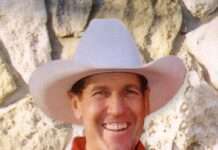In early July, Heath Hogan began making the rounds. The new Smoky Valley Schools Superintendent has wasted no time meeting people, attending and speaking at events, letting people know he’s done his homework.
At the Lindsborg Kiwanis Club recently, Hogan had the crisp casual assurance of someone who knows what he’s talking about, where he’s headed. He spoke of his family’s deep history in agriculture, his 25 years in education, all with the Garden City district (enrollment, 7,200), where he had been deputy superintendent for seven years. Among the questions, one or two about the state legislature and its scrutiny of public schools.
“There will be a war on public education,” he said. State funding for public schools is again a prime target for budget cuts. Public finance of private schools is on the rise. New legislation allows students to attend in any district in Kansas. The threat is “serious,” he said. “We have to stand up for ourselves.”
*
The Kansas Legislature, dominated by Republicans, has put local schools in the cross-hairs since the dark Brownback years. In 2015 there were attempts to abolish the school finance act and slash education funding. Teacher pensions were targeted, in an attempt to backfill a $400 million state budget deficit – a result of tax cuts for corporations and wealthy individuals.
Model legislation drafted by far-away cause lobbies became Republican marching orders at many state Capitols, including Topeka. Examples:
– Educators using material viewed by others as “harmful” to minors could be charged with a crime. The legislation was vague, leaving such terms as “obscene” and “harmful” to the imagination.
– Teachers’ and state employees’ pensions would be raided to fill part of the budget hole. To recover the money, $1 billion in bonds would be issued, the money advertised as “aid for schools.” Bond proceeds would be invested in the stock market. In truth it was a Ponzi scheme, history’s first margin call on what had been a teacher retirement fund.
– Lawmakers tried to forbid job-related paycheck deductions, a way to cancel payroll contributions for (teacher) union dues. The measure affected a long list of deductions for other purposes, including charitable and non-profit contributions.
– Bills were introduced to require that school district employees be fingerprinted and submit to criminal background checks every five years.
The teacher shortage grew. By 2015, more than 3,700 teachers had left Kansas, retired or taken jobs outside education after that school year. Between 2013 and 2015, roughly 15 percent of the state’s 24,000 teachers had gone away. Many said that, given the opportunity, they would follow colleagues who had left to teach in another state, or leave the profession.
*
The 2022 Legislature piled on. One bill created bigger “educational savings accounts” by sending more public money to private schools. It also sidestepped the Supreme Court and enforcement of equity in public school finance.
Another measure included a ‘parents bill of rights’ requiring teachers to post online every piece of material they use and to give parents more say about what goes on in the classroom.
The state’s obscenity law was to be changed. Teachers using material which depicts “homosexuality” could be charged with a class B misdemeanor.
Legislators have also pressed to weaken student vaccination programs, denounce or fire teachers for using “offensive” materials, ban from libraries any materials considered obscene by a measure of “community standards.”
Gov. Laura Kelly, a Democrat, has resisted when possible.
*
A recent study by the Rand Corporation said that nearly a third of Kansas teachers and principals were likely to leave their jobs by the end of the school year. The covid pandemic and teachers’ heightened stress and burnout has taken hold.
The Rand study found that many teachers, principals and superintendents felt threatened and were dispirited. They are leaving, retiring or headed for other jobs. Kansas now faces a growing teacher shortage. According to the Rand study, 1,400 teaching jobs (roughly four percent) are unfilled.
Heath Hogan is assured, assertive. He said the teacher shortage in Kansas is real and growing. Garden City, he said, begins the school year with 60 substitute teachers.
“The Smoky Valley schools so far do not have a teacher shortage,” he said. “We have every position filled but for a couple of paras. But that (a shortage) is bound to happen as people age out and retire. We need to be proactive about this,” he said. “Smoky Valley has fine teachers and administrators and a lot of very good and welcoming people. We have great schools here. I don’t want that to change.”





